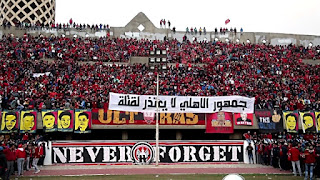
Von James M. Dorsey
Der Kampf der autoritären Staats- und Regierungschefs in der Türkei und in Ägypten um die Kontrolle der Fußballstadien und öffentlichen Räume versetzt militante Fußballfans in Aufruhr.
Jahrelange Auseinandersetzungen in den Stadien und bei Massenveranstaltungen griffen von den Tribünen auf die Straßen über und mündeten 2011 in Proteste gegen die Regierung, die schließlich zum Sturz des ägyptischen Staatspräsidenten Hosni Mubarak führten. 2013 erschütterten die Protestbewegungen auch die Türkei und ließen in der Folge die autokratischen Züge von Präsident Recep Tayyip Erdoğan erstarken.
Der vom General zum ägyptischen Präsidenten mutierte Abdel Fattah al-Sisi verlagerte eine neue Abteilung seines Innenministeriums nach Neu-Kairo, östlich der ägyptischen Hauptstadt, in die dortige Polizeiakademie. Hierhin wurde das Ministerium zuvor aus der Innenstadt von Kairo verlegt, wo es seit längerem Ziel von Protesten ist. Die Polizeiakademie fasst die Generalstaatsanwaltschaft, die Staatssicherheit sowie Justizbehörden mit der Absicht zusammen, den Demonstranten in Zeiten steigender Unzufriedenheit die symbolischen Ziele ihres Protestes zu nehmen.
“Die Sicherheitslage ist eng verbunden mit den regierungskritischen Aktionen gewisser Demonstranten im Zentrum von Kairo, die Chaos im Land verbreiten wollen”, so der ehemalige Leiter der Polizeiakademie, General Ahmad al-Badry, gegenüber der Online-Publikation “Al-Monitor”.
Continue reading “Proteste von Fußballfans in Ägypten und in der Türkei Geschlossene Abwehrkette”




